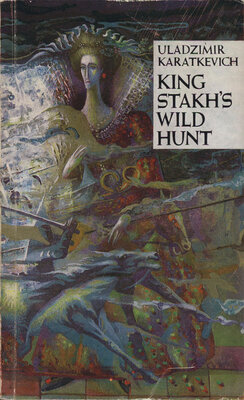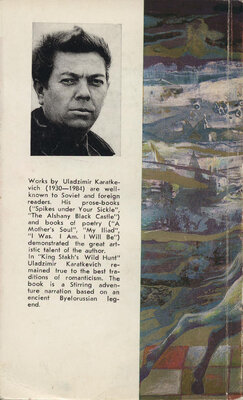King Stakh's Wild Hunt
Уладзімір Караткевіч
Выдавец: Мастацкая літаратура
Памер: 248с.
Мінск 1989
sented to admit you into her house, and even lets you share her supper-table. (I hope, sir, you will excuse me). You are evidently the most worthy of all those who have been here in the last three years.”
“You mean then,” I said, surprised, “that you are not the mistress?”
“I’m the housekeeper,” the old woman answered with dignity. “I am the housekeeper. In the best of the best houses, in a good family, understand this, Mr. Merchant. In the very best of the best families. This is even better than being the mistress of a family not of the very best.”
“Then what family is this?” I asked imprudently. “And where am I?”
The old woman’s eyes blazed with anger.
“You are in the castle of Marsh Firs. And you ought to be ashamed of yourself not to know the owners. They are the Yanowskys. You understand, the Yanowskys! You must have heard of them!”
I answered that I had, of course, heard of them. And this reassured the old woman.
With a gesture worthy of a queen, she pointed to an armchair, (approximately as queens do in the theatre when they point to the executioner’s block ready for their unlucky lover: “There’s your place, you ill-fated one’”), asked to be excused and left me alone.
The change in the old woman surprised me greatly. On the ground floor she moaned and lamented, spoke with that expressive intonation of the people, on the first floor she immediately changed, became the devil alone knows what. Apparently, on the ground floor she was at home, whereas on the first she was nothing but
the housekeeper, a rare guest, and changed correspondingly with the passage.
Remaining alone, I began to examine the portraits that gleamed on the walls. There were about seventy of them, some ancient and some quite new — and a sad sight they made.
Here a nobleman dressed in something like a sheepskin coat — one of the oldest pictures— his face the face of a peasant, broad, healthy, with thick blood in his veins.
And here another, this one already in a long silver-woven tunic with a girdle, a wide beaver collar falling across his shoulders (a sly protobeast you were, young man!). Next to him a powerful-looking man with shoulders like stone and a sincere look about him, in a red cloak (at his head a shield with the family coat-ofarms, the top half smeared with black paint). And farther on, others just as strong, but with oily eyes, lopped off noses, their lips hard.
Beyond them portraits of women with sloping shoulders, women created for caresses. Faces were such that would have made an executioner weep. Mostlikely some of these women did actually lay their heads on the executioner’s block in those hard times. It is unpleasant to think that these women took their food from their plates with their hands, and bedbugs made their nests in the canopies of their beds.
I stopped off at one of the portraits, fascinated by a strangely wonderful, incomprehensible smile, a smile which our old masters so inimitably painted. The woman looked at me mysteriously and with compassion.
“You, you little man,” her look seemed to say. “What have you experienced in life? Oh! If you could have seen the torches blazing on the
walls of the hall during feasting and revelry, if you could have known the delight in kissing your lovers till they bled, to make two men fight a duel, to poison one, to throw another to the executioner, to aid your husband to fire from the tower at the attacking enemies, to send yet another lover to the grave for love of you, and then to take the blame on yourself, to lay your head with its white wide forehead and intricate hair-do on the block.”
I swear upon my honour that that is what she said to me, and although I hate aristocrats, I understood, standing before these portraits, what a fearful thing is “an ancient family”, what an imprint it leaves on its descendants, what a heavy burden their old sins and degeneration lay on their shoulders.
And I understood also that uncountable decades had flown by since the time when this woman sat for the painter. Where are they now, all these people with their hot blood and passionate desires, how many centuries have thundered over their decaying bones?
I felt the wind of the centuries whistling past my back, and the hair on my head stood on end.
And I felt also the cold that reigned in this house, a cold that even the fireplaces burning night and day could not drive out.
Enormous, gloomy halls with their dusty smell, with their creaking parquet floors, their gloomy corners, their eternal draughts, the smell of mice and dust and cold, such a cold that made your heart freeze, a cold that centuries had gone into making, a cold created by an entailed estate, the exclusive right of inheritance belonging to the eldest son, by an enormous, now impoverished and almost exitnct family.
Oh! What a cold it was! If our late decadents, singing praises to the dilapidated castles of the gentry, were left here overninght, for just one night even, they would very soon ask to be taken out and put on the grass in the warm sunshine.
A brave rat ran diagonally across the hall. I winced.
I turned to more of the portraits. These portraits were of a later period. And altogether different. The men had a kind of a hungry look, a discontented look. Their eyes like those in old seladons, on their lips an incomprehensible, a subtle smile and unpleasant causticity. And the women were different: their lips too full of lust, their look mannered and cold. And very obvious were their hands, now much weaker hands: beneath their white skin, both in the men and the women, blue veins were visible. Their shoulders had become narrower and were thrust forward, while the expression on their faces showed a markedly increased voluptuousness.
Life, what cruel jokes you play on those who for centuries live an isolated life, and come into contact with the people only to bring bastards into the world!
It was difficult and unpleasnt for me to look at all this. And again that feeling of a sharp, incomprehensible cold...
I did not hear any steps behind my back, it was as if someone had come flying through the air. I simply felt suddenty that someone was standing behind my back, looking at me. Then under the influence of this look, I turned around. A woman stood behind me, looking at me questioningly, her head slightly bent. I was stunned. It seemed to me as if the portrait that had just been talking to me, had suddenly
conic to life and the woman in it had stepped down from it.
I don’t even know what they had in common. The one in the portrait (I looked around at it and saw that she was in her place) was tall, well-built, with a great reserve of vitality, merry, strong and beautiful. While this one was simply a puny creature.
Still there was a resemblance, a kind of super-resemblance that can force us to recognize two men in a crowd as being brothers, although they do not resemble each other: one a brunette and the other a blond. Yes, and here there was even more. Their hair exactly alike, their noses of the same form, their mouths with the same kind of slit and the same white even teeth. Added to this there was a general resemblance in the expression on their faces, something ancestral, eternal.
And nevertheless I had never before seen such an unpleasant-looking person. Everything alike and everything somehow different. Short of stature, thin as a twig, thighs almost undeveloped and a pitiable chest, light blue veins on the neck and hands, in which there seemed to be no blood at all — so weak she was, like a small stem of wormwood.
Very thin skin, a very thin neck, even the hair-do somehow inexpressive. Which seemed so very strange because her hair was of the colour of gold, fluffy and surprisingly beautiful. Whatever was that absurd knot for at the back of her head?
Her features were so expressive, sharply defined, regularly proportioned that they would have served as a model for even a great sculptor, but I doubt whether any sculptor would have been tempted to use her as a model for
Juno: seldom does one see such an unpleasant face, a face to be pitied. Crooked lips, deep shadows about her nose, her face a greyish colour, black eyes, their expression fixed and incomprehensible.
“The poor thing is devilish ugly,” I thought, sympathizing with her, and I lowered my eyes.
I know many women who would never to their dying days have forgiven me my lowered eyes, but this one was probably accustomed to seeing something similar on the faces of the people she met with: she paid absolutely no attention to my eyes.
I was unpleasantly surprised by this frankness, to put it mildly. What was it? A subtle calculation or naivete? But no matter how much I looked into this distorted face, I couldn’t see in it any ulterior motive.
Her face was artless, like that of a child. But her voice was most convincing: slow, lazy, indifferent, and simultaneously timid and broken like the voice of a forest bird.
“And also, as a matter of fact, I saw you even before that!”
“Where?” I was frankly amazed.
“I don’t know. I see many people. It seems to me that I’ve seen you in my sleep... Often... Didn’t you ever happen to feel as if you had lived somewhere formerly and long ago... and now you discover you are looking at something you had seen long, long ago?...”
I am a healthy man. And I had not yet known then that something similar sometimes happens to nervous people with a very keen perception. The connection between primary conceptions, and subsequent notions is somehow disturbed in the memory, and things
very much alike seem identical to them; in objects entirely unknown to them they reveal something long known to them. Whereas the consciousness — ever a realist — resists this. And so it happens that an object is simultaneously unfamiliar and mysteriously familiar.
I repeat I had not known that. And even so it never for a moment entered my head that this girl could tell a lie, such sincerity and indifference were felt in her words.
 КНІГІ ОНЛАЙН
КНІГІ ОНЛАЙН


